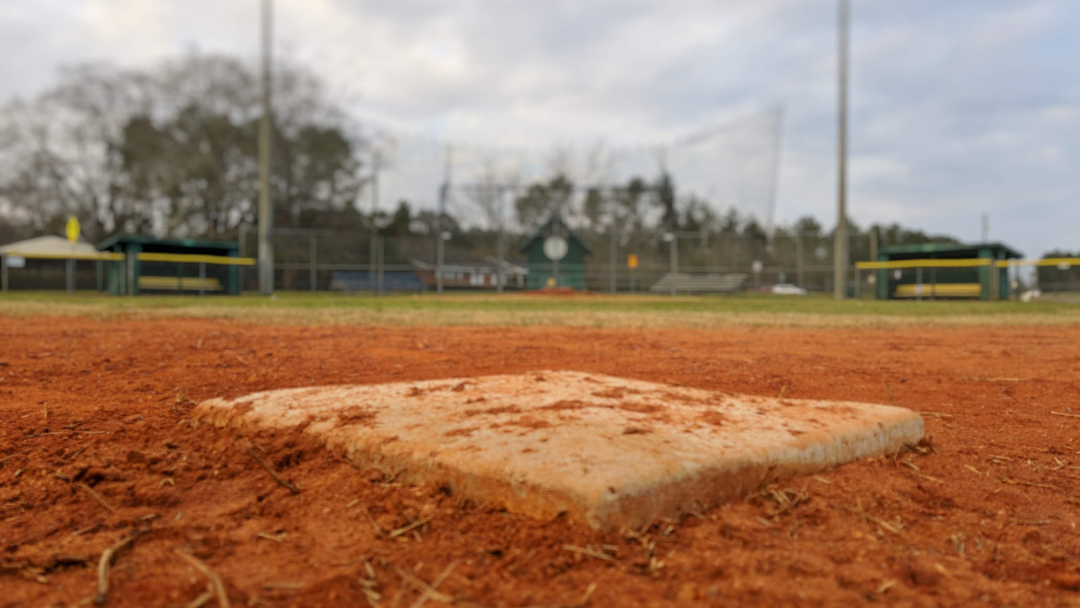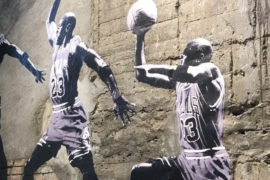THE ONE-LEVEL THOMASTON HOUSE ON THE HILL IS SLOWLY COMING ALIVE. Every time the front door creaks open and swings shut behind a new visitor, Annette shoos away the dogs and offers the newcomers a warm hug. They have come to celebrate her husband Dan’s fifty-fifth birthday. Dan’s local siblings Sheila, Kathy, Steven, and Sharon have all arrived by now. An old friend from high school has made the trip from Waterbury, and he makes small talk with the two tellers in attendance from the local bank. All is cheerful as the guests sink deeper and deeper into their seats on the living room couches and chairs, their coffees growing cold from good conversation. Surveying the room, Annette is delighted to see Dan’s small circle of friends and family enjoying each other’s company. Then she realizes, one couple is missing.
The eleven-year-old southpaw sensation mops the sweat from his forehead with his sleeve and readjusts his cap. He exhales a deep sigh and squints at his teammates in the outfield a whole world away, expressionless figurines he hopes will not now be needed. His heart drums a few beats quicker as he registers the furiously rattling chain link fences and rumbling feet on the bleachers coming from behind him. Playing third base, Kevin gives his glove a few gentle knocks with his fist. Steven kicks at the dirt near first, raking the area of any pebbles that might misdirect a ground ball hit his way. Dan gathers himself and climbs back onto the pitcher’s mound. Mountainous Owen stoops into position behind the plate and pulls down his mask. The Canfield boys have already played out this moment in their front yard so many times that getting the final out in this little league rivalry game seems like just another afternoon pastime.
Owen signals curveball, Dan’s magnum opus. The batter sees it arriving chest high but freezes as it suddenly disappears below his waist. Owen wants another curve, outside. The batter is expecting, but Dan’s accuracy is perfect, and the batter’s angst whirls him in a semi-circle. Owen senses his frustration and calls for a fastball up and in to end the game. Dan winds up and arcs his arm forward, summoning all his force. Anticipating another signature off-speed pitch, the batter hesitates. To his immediate dismay, the ball claps victoriously in Owen’s glove. A frenzied metallic firestorm reemerges from the chain link fences and bleachers. The batter pitches his head back and utters a groan before sulking back to the dugout. Owen pops up and jogs out to the mound. He pats his little brother on the back for a job well done and a victory well earned. Steven and Kevin are in tow. Soon the entire team encircles Dan, grabbing at his hat, shaking his head, and jostling him around in celebration. It is a good day to be Dan Canfield.
When he is eighteen, Dan has his first seizure. It is alarming, and nothing seems to have caused it. Weeks later he has another. They continue to come sporadically and seemingly without a cause. Even so, he is able to get a driver’s license and goes to a local community college where he earns his associate’s degree. Unable to find a good use for it, Dan decides to leave his hometown in Torrington, Connecticut for Scottsdale, Arizona, where Sean, his friend from high school, has offered him a place to land. The bats, balls, and gloves that once littered the front lawn now collect dust in storage bins in the Canfields’ basement. They are a reminder of what happens when one stays idle for too long. So it is that Dan heads west in search of revival.
And it is revival that he finds. Dan gets a job working as a handyman at a local hotel. He does his work proudly despite his occasional disability. His pleasant nature and calm demeanor make an especially strong impression on a young concierge named Annette. Before long, the two are dating. They move in together and eventually marry, solidifying their love and commitment to each other in a ceremony at which all ten of the Canfield siblings are present. Even as Dan’s life grows fuller, he still makes time for his boyhood love. Every so often he bikes to the bus stop, mounts it to the rack on the front of the bus, and rides to Chase Field to watch the Diamondbacks play. In the years to come, Dan will suffer extensive memory loss, but these are days that he will always remember.
It is January 27, 1994, Dan’s birthday. His sister, Sheila, is in the hospital. She has gone into labor with her second child, a boy she and her husband Chris will name Michael. Dan is incredibly proud to have a nephew born on his birthday, and in several years Dan has a son of his own. When Dan and Annette welcome Eric into the world, Dan’s trips to the ballpark are put on hold. His seizures become increasingly common, and the small family’s finances are an added stress. The young couple do their best to manage, but eventually move back to Connecticut where they are closer to family support.
As Dan gets older, his seizures get worse. They can last several minutes, and when they are over, he remembers nothing of them. They sap his energy, but he tries not to let them dictate his life. He has long been unable to drive, so he transports around town on his bicycle. The exercise is a relief, but more than once he has awoken on the side of the road surrounded by strangers and ambulances. There are many good Samaritans who, thinking they are doing the right thing, will call for help, but the attention they bring is discomforting. When Dan has a seizure in public, some onlookers become frightened, some even laugh, and everybody stares. For those who don’t know him and his condition, the seizures are alienating. As a result, Dan’s days are long and lonely. In a normal day, he walks the dogs, rides his bike to the bank to withdraw $10, grabs something to eat with the money, then returns home to walk the dogs again and do a little writing.
Dan turns 50, and he is still without a remedy. He has had a neuro-pacemaker implanted in his brain, but it makes no difference. He takes a variety of daily medications that have some luck staving off the seizures, albeit with debilitating side effects. Annette is a fighter and won’t let Dan lose hope. They still go on dates, and she plans trips that keep them both young and adventurous. She brings him to countless doctor’s visits and is his biggest advocate. There is no possible treatment that she has not researched and considered. Or so it seems. Until she meets Nina and Kareem.
In her endless pursuit for answers, Annette finds Blue Boy Boxing Club. Kareem Blue and his wife, Nina, are the owners. Kareem grew up in the lower east side of Manhattan and began boxing when he was eight. He was a prolific amateur fighter, but nagging back injuries forced him out of the ring. He and Nina moved to Bethlehem, Connecticut, where he began working as a personal trainer. In 2015, he put a down payment on a gym of his own. Blue Boy Boxing is now a flourishing enterprise, teaching men and women of all ages and abilities “the sweet science of boxing.” Kareem has trained several young, able athletes who have championed local and state tournaments. He teaches boys and girls as young as 6 how to defend themselves. All feel welcome and inspired to be their best in this gym. Especially the group of ten, of which Dan is now a member, who are up against the greatest fight of their lives.
Parkinson’s disease is a disorder of the central nervous system. When nerve cells in the brain are damaged, dopamine levels drop and the tremors that characterize Parkinson’s ensue. It begins to develop in those who get it after the age of fifty with worsening symptoms over time. Of yet, there is no cure. But there are hopeful treatments, and boxing is among them. High-intensity exercise shows promise for slowing the progression of Parkinson’s by catalyzing neurological changes in the brain. It is thought to reduce dopamine-depleting agents and promote healthy brain cell growth. The vigor of a boxing workout stimulates these effects, as well as trains for balance, control, strength, agility, and other abilities deteriorated by Parkinson’s. Boxing also provides a community that understands and uplifts each other. Although Dan does not have Parkinson’s, he finds himself at home in the small group that meets three days a week to fight off the neurological disorders that constantly test their wills.
The soles of the fighter’s well-worn New Balance shoes grip the ground in an alternating pattern as he shifts his weight from one foot to the other. A wire of tendon peaks out from behind the sweaty tube socks then disappears into flesh. With each flexion, the calf bulges, and the hamstring contracts. The fighter’s burning quads evoke a grimace on his face. A dark V of sweat marks the back of his grey T-shirt. His chest is up, and his shoulders are back. His arms wag loosely at his sides, bouncing with each movement. On his hands, he wears gloves for throwing, not catching. The fighter draws in a deep breath to ease the strain on his muscles. Droplets of sweat run down his face. Suddenly, a whistle pierces the air.
Dan bends his knees and crouches slightly forward. He brings up his hands in a defensive position and tucks his head behind them. The southpaw presses onward, the direction he has pursued all his life. At Kareem’s command, he positions his feet and readies to swing. The heavy bag sways almost imperceptibly, staring back at Dan blithely. Another whistle screams sharply.
The fighter churns his legs, propelling the wheels toward home. His T-shirt is wet against his back. The muscles in his head and neck want to concede to gravity and exhaustion, but they don’t. Dan’s energy is nearly depleted as he bikes home from another bout of training, but his mind is preoccupied with his 55th birthday next week. His mother died when she was 55, and it is a year that all the Canfield siblings have met with apprehension. Now that feeling envelopes Dan.
Inside, there is laughter and joy, coffee and cake, friends and family. To an outsider peering in, it might seem that the circle is full, the celebration complete, but a crucial link is still missing. A knock on the door suddenly summons the dogs. Dan approaches and opens it. Kareem and Nina smile back at him. Tomorrow will be a new day fresh with old challenges, but today, in this moment, there is only the company of champions.
MIKE BURKE is a budding writer from New England who is proud to share a birthday with his Uncle Dan. You can also read his work at The Dillydoun Review.
Like what you’re reading?
Get new stories, sports musings, or book reviews sent to your inbox. Drop your email below to start >>>
NEW book release
Ghosts Caught on Film by Barrett Bowlin. Order the book of which Dan Chaon says “is a thrilling first collection that marks a beginning for a major talent.”
GET THE BOOK



